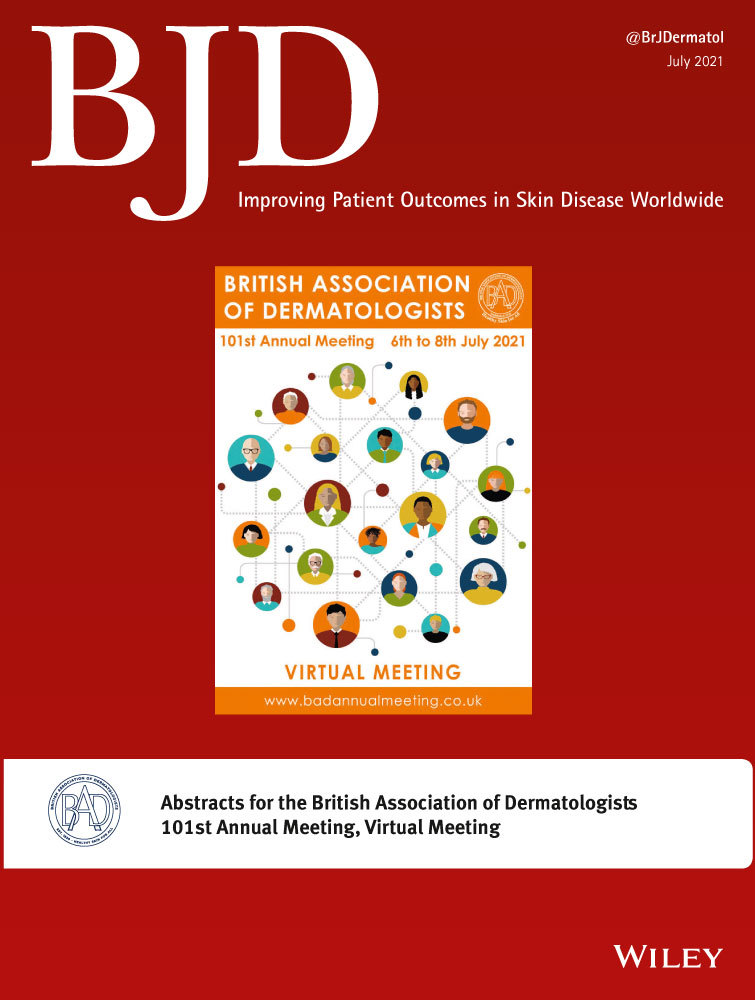O07: Efficacy of abrocitinib monotherapy in patients with prior exposure to systemic treatments: pooled results from the JADE MONO-1 and JADE MONO-2 studies
M. Ameen,1 W. Sin Chiu,2 R. Rojo,3 P. Biswas,4 W. Romero2 and M. Ardern-Jones 5
1Royal Free Hampstead NHS Trust, London, UK; 2Pfizer Inc., Surrey, UK; 3Pfizer Inc., Groton, CT, USA; 4Pfizer Inc., New York, NY, USA; 5Clinical Experimental Sciences, Faculty of Medicine, University of Southampton, Southampton, UK
Effective options for previously treated moderate-to-severe atopic dermatitis (AD) are needed. Monotherapy of abrocitinib, an oral, once-daily, Janus kinase 1 selective inhibitor, was shown to be effective and safe for moderate-to-severe AD in two phase III trials [JADE MONO-1 (NCT03349060) and JADE MONO-2 (NCT03575871)]. In this post-hoc analysis of pooled data from the aforementioned studies, we investigated the efficacy of abrocitinib monotherapy (200 mg or 100 mg) or placebo in patients aged ≥ 12 years previously exposed to systemic therapies (except systemic corticosteroids), including dupilumab. Response was evaluated at week 12 using Investigator’s Global Assessment (IGA) response [clear (0) or almost clear (1) with ≥ 2 points improvement], a ≥ 75% improvement in Eczema Area and Severity Index (EASI 75), and a composite of ≥ 50% improvement in EASI (EASI 50) and ≥ 4-point improvement in Dermatology Life Quality Index (DLQI). Of 778 patients, 26·0% had received prior systemic agents, including ciclosporin (12·7%), other nonbiologics (i.e. methotrexate, azathioprine and mycophenolate; 9·3%) and dupilumab (5·7%). At week 12, more patients exposed to prior systemic treatment who received abrocitinib 200 mg or 100 mg achieved IGA 0/1 (37·5% and 17·9%, respectively), EASI 75 (59·2% and 32·1%, respectively) and the EASI 50/DLQI composite response (72·6% and 47·3%, respectively) than placebo-treated patients (2·4%, 9·5%, and 9·1%, respectively; Table 1). Some patients who had an unsatisfactory response to ciclosporin or dupilumab achieved disease improvement with abrocitinib, with the 200-mg dose more effective than 100-mg one.
Funding sources: this study was sponsored by Pfizer.
| Response | Abrocitinib | Placebo | ||||||
|---|---|---|---|---|---|---|---|---|
| 200 mg | 100 mg | |||||||
| n (%) | 95% CI | P-value | n (%) | 95% CI | P-value | n (%) | 95% CI | |
| IGA 0/1 | ||||||||
| Previously exposed to systemic agent | 27/72 (38) | 26·3–48·7 | < 0·001 | 15/84 (18) | 9·7–26·0 | 0·001 | 1/42 (2) | 0·0–7·0 |
| Previously failed ciclosporin | 14/37 (38) | 22·2–53·5 | 0·002 | 3/36 (8) | 0·0–17·4 | 0·83 | 1/15 (7) | 0·0–19·3 |
| Previously failed dupilumab | 2/6 (33) | 0·0–71·1 | 0·083 | 1/7 (14) | 0·0–40·2 | 0·280 | 0 | 0·0–60·2 |
| EASI 75 | ||||||||
| Previously exposed to systemic agent | 42/71 (59) | 47·7–70·6 | < 0·001 | 27/84 (32) | 22·2–42·1 | < 0·001 | 4/42 (10) | 0·6–18·4 |
| Previously failed ciclosporin | 21/37 (57) | 40·8–72·7 | < 0·001 | 7/36 (19) | 6·5–32·4 | 0·166 | 1/15 (7) | 0·0–19·3 |
| Previously failed dupilumab | 3/6 (50) | 10·0–90·0 | 0·014 | 2/7 (29) | 0·0–62·0 | 0·094 | 0 | 0·0–60·2 |
| EASI 50 and DLQI ≥ 4-point improvement | ||||||||
| Previously exposed to systemic agent | 45/62 (73) | 61·5–83·7 | < 0·001 | 35/74 (47) | 35·9–58·7 | < 0·001 | 3/33 (9) | 0·0–18·9 |
| Previously failed ciclosporin | 23/34 (68) | 51·9–83·4 | < 0·001 | 12/31 (39) | 21·6–55·9 | 0·016 | 1/11 (9) | 0·0–26·1 |
| Previously failed dupilumab |
4/6 (67) |
28·9–100·0 | 0·317 | 2/7 (29) | 0·0–62·0 | 0·882 | 1/3 (33) | 0·0–86·7 |
- P-values refer to comparison vs. placebo.




